Appel à contribution pour Albineana 37 (2025), dirigé par Mathilde Bernard, Nadine Kuperty-Tsur et Alicia Viaud
Le rapport d’Agrippa d’Aubigné aux femmes n’est pas simple ; l’enfant aegre partus ne doit sa vie qu’à la mort de l’une d’entre elles, ce qui peut expliquer une tendance à la mise à distance. De nombreuses femmes sont ainsi présentées comme des incarnations d’une altérité radicale : la mère, cette figure qui, pour absente qu’elle soit, hante l’entièreté de l’œuvre, sous des dehors la plupart du temps peu rassurants, mais néanmoins ambivalents[i] ; l’amante, qui revêt des habits pétrarquistes aux chatoiements inquiétants et qui, jeunesse éclatante a son double dans les vieilles repoussantes du Printemps[ii] ; les femmes « détestées », qui sont présentées comme des symboles de débauche[iii] ; les reines qui deviennent sorcières sous sa plume[iv] ; les parangons bibliques de l’impiété – Jézabel[v] et autres Athalie – ; ou les femmes mythiques venues du monde gréco‑romain pour faire du poète une proie, Diane la chasseresse[vi], qui bien sûr se cache dans la belle Salviati, autre menace de mort.
À côté de ces femmes si diverses en possibilité d’anéantissement du corps et de l’âme de l’écrivain – car ces figures sont avant tout littéraires –, Agrippa d’Aubigné offre aux lecteurs de nombreux exemples de femmes admirables, qui dans leur grandeur n’en sont pas moins pour la plupart également mises à distance. Au rang de ces femmes viennent en premier lieu les martyres : les sœurs Foucaude – des enfants –, Jane Gray, jeune, reine, vertueuse et pieuse[vii]… Puis les reines protestantes qui ont su gouverner en homme, éloge équivoque s’il en est : Elizabeth, Jeanne d’Albret[viii], figurant de nouvelles Deborah.
Enfin viennent d’autres femmes, plus accessibles sans doute, celles qui se sacrifient pour leur parti, comme Catherine de Bourbon[ix], nouvelle Esther, des femmes poètes et salonnières comme les dames des Roches[x] ou, plus proches encore du peuple, ces figures de la dévotion, jeune fille allaitant le vieillard et à l’inverse femme âgée (aux mamelles taries) allaitant un nourrisson. Quelques‑unes enfin, bien réelles celles‑là, tissées à la vie d’Agrippa d’Aubigné et présentes en ses écrits : ses femmes, ses filles.
Comment dès lors concilier ce mélange d’attirance et de répulsion dont le Printemps se fait l’écho, d’admiration pour des femmes qui sont le lieu et la preuve de la grâce suprême de Dieu, n’agissant jamais tant que lorsqu’elle élève la faiblesse, et de mépris horrifié pour la putain et la sorcière, de connivence[xi] et de hiérarchisation des rapports[xii] ? Comment comprendre que la femme soit le plus souvent tenue à distance respectable : faut‑il en chercher les raisons dans les structures patriarcales d’une société qui n’assigne pas aux femmes un rôle de même importance qu’aux hommes, dans la vie d’un enfant à qui a manqué une présence féminine, d’un amant éconduit, d’un veuf éploré, d’un sujet méfiant d’une souveraine aux finesses italiennes ? Quel est le sens de la parole ou du silence des femmes dans l’œuvre d’Agrippa d’Aubigné ? Comment les voix féminines et les voix de l’énonciateur se mêlent‑elles et dans quelle optique[xiii] ? Quelle possibilité les femmes protestantes ont‑elles de se faire entendre[xiv] ? Peut‑on, avec Catharina Randall Coats[xv], penser un « parler mystique » de la femme albinéenne, qui l’élèverait à un statut équivalent à celui de l’énonciateur de la fin des Tragiques, « extatique », « au giron de son Dieu » ?
Les articles s’intéresseront aux différents aspects de la présence des femmes dans la vie et dans l’œuvre d’Agrippa d’Aubigné. Ils pourront adopter un angle biographique, interrogeant le rôle des amants, des épouses et des filles dans l’existence de l’écrivain, et croiser cette approche avec une analyse des représentations des figures féminines dans l’œuvre. On pourra également axer sa réflexion sur la dimension symbolique et mythique de la représentation des femmes admirées ou honnies, sur la trace, l’inflexion féminines de l’écriture ; considérer la question politique, la résistance, le zèle des femmes ; voir comment en elles réside paradoxalement la plus grande fiance d’Agrippa (les plus zélés sont pour beaucoup des femmes) et son plus grand effroi (les plus machiavéliques sont sans doute des femmes). Les articles se demanderont comment concilier les rapports de l’homme avec les personnes et les rapports de l’écrivain avec les êtres de papier, afin de rendre compte d’une vision des femmes plus riche que les passages canoniques offrant à les voir victimes ou démons nous laissent augurer. Le volume s’ouvrira à des articles présentant la place particulière de la femme protestante à cette époque, ainsi qu’à des réflexions plus larges sur la représentation des femmes à la Renaissance.
Les propositions de contribution, de quelques lignes, sont à rendre avant le 31 mai 2024 aux adresses suivantes : bernardm@parisnanterre.fr, alicia.viaud@umontreal.ca, kuperty@tauex.tau.ac.il.
Après acceptation de la proposition de contribution, les articles d’environ 30 000 signes, en français ou en anglais, seront à rendre pour le 1er mars 2025.
[i] Voir Jean‑Raymond Fanlo, Tracés, ruptures. La composition instable des Tragiques, Paris, Champion, 1990, chap. I, 3.2, « Les figures ambivalentes de la mère », p. 83‑87.
[ii] Voir Véronique Ferrer, L’Amoureuse rage. Agrippa d’Aubigné poète profane, Genève, Droz, 2022 et Le Printemps, Julien Goeury (éd.), Paris, Classiques Garnier, 2023.
[iii] Voir Éliane Viennot, « Agrippa d’Aubigné, Marguerite de Valois et le Divorce satyrique », Albineana, 7, 1996, p. 87-111.
[iv] Voir Jean‑Raymond Fanlo, « Catherine de Médicis, monstre femelle. Agrippa d’Aubigné, Les Tragiques, livre I », dans Régis Bertrand et Anne Carol (dir.), Le « Monstre » humain : Imaginaire et société [en ligne], Aix-en-Provence, Presses universitaires de Provence, 2005.
[v] Voir Gisèle Matthieu‑Castellani, Agrippa d’Aubigné. Le Corps de Jézabel, Paris, Presses universitaires de France, 1991.
[vi] Voir Jean‑Raymond Fanlo et Marie‑Dominique Legrand (dir.), Le Mythe de Diane en France au XVIe siècle, Albineana, 14, 2002.
[vii] Voir Antoinette Gimaret, « “Ses gants et son livret pour faire testament”. Le récit de la mort de Jane Grey dans l’Histoire des Martyrs de Jean Crespin et les Tragiquesd’Agrippa d’Aubigné », dans Line Cottegnies, Anne‑Marie Miller‑Blaise et Christine Sukic (dir.), Objets et anatomie du corps héroïque dans l’Europe de la première modernité, Paris, Classiques Garnier, 2019, p. 25‑45.
[viii] Voir Marie‑Madeleine Fragonard, « L’éloge d’Elisabeth », dans François Charpentier (dir.), Les Tragiques d’Agrippa d’Aubigné. Actes de la journée d’étude Agrippa d’Aubigné, 9 nov. 1990, Cahiers Textuel, 9, 19 1, p. 39-52 ; Cécile Huchard, « Jeanne d’Albret, Élisabeth d’Angleterre, reines, et héroïnes protestantes ? », dans Gilbert Schrenck, Anne-Elisabeth Spica, Pascale Thouvenin (dir.), Héroïsme féminin et femmes illustres (XVIe‑XVIIe siècles). Une représentation sans fiction, Paris, Classiques Garnier, 2019, p. 91‑105.
[ix] Voir le Traitté des douceurs de l’affliction, Gilbert Schrenck (éd), dans Œuvres, t. III, Paris, Garnier, 2014.
[x] Voir Madeleine Lazard, « Deux féministes poitevines au XVIe siècle : Les dames des Roches », Albineana, 3, 1990, p. 143‑153.
[xi] Cette connivence et cette proximité confiante furent semblent‑ils au fondement des liens conjugaux qui unissait Agrippa d’Aubigné tant à Suzanne de Lezay qu’à Renée Burlamacchi (voir Gilbert Schrenck, notices en ligne sur les femmes d’Agrippa d’Aubigné dans le Grand Dictionnaire des Femmes de l’Ancien Régime, 2005 : Aubigné (Michèle), Burlamacchi (Renée), L’Estang (Catherine de), Lezay (Suzanne de), Limur (Anne de), Salviati (Diane)). Elle marque aussi la couleur de la relation qu’il a entretenue avec Catherine de Bourbon, mélange de respect, d’admiration et d’amitié (outre son introduction de l’édition du Traitté des douceurs de l’affliction, on pourra consulter l’article suivant de Gilbert Schrenck : « Rhétorique de l’affliction : Catherine de Bourbon, Agrippa d’Aubigné et la Conférence de Nancy (1600) », dans Claude La Charité et Roxanne Roy (dir.), Femmes, rhétorique et éloquence sous l’Ancien Régime, Saint-Étienne, Publications de l’université de Saint-Étienne, 2012, p. 299‑310).
[xii] Rare sont les femmes qui peuvent gouverner et il semble clair par ailleurs qu’Agrippa d’Aubigné n’assigne pas le même rôle aux femmes qu’aux hommes, comme en témoigne la Lettre à ses filles.
[xiii] Voir Samuel Junod, « Voix féminines dans l’œuvre d’Aubigné », Women in French Studies, 11, 2003, p. 25‑37.
[xiv] Catharina Randall Coats, « Shouting Down Abraham: How Sixteenth Century Huguenot Women Found Their Voice », Renaissance Quarterly, vol. 50, 2, 1997, p. 411‑442?
[xv] Catharina Randall Coats, « La femme : un prétexte silencieux dans l’œuvre d’Agrippa d’Aubigné », Albineana, 7, 1996, p. 76.




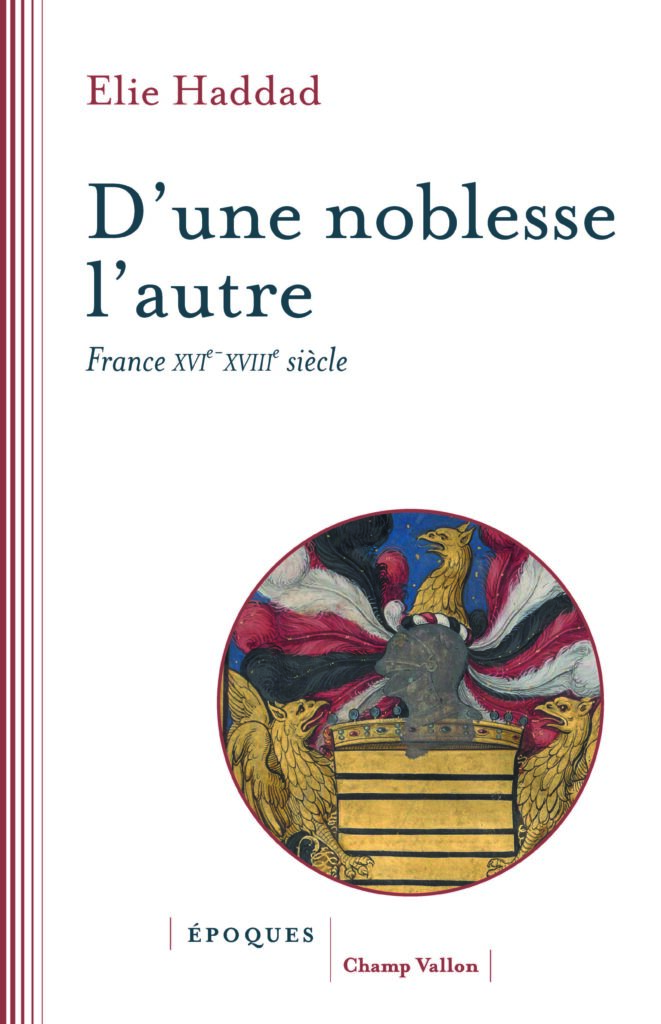 Elie Haddad, D’une noblesse l’autre France XVIe-XVIIIe siècle, ChampVallon, 2024.
Elie Haddad, D’une noblesse l’autre France XVIe-XVIIIe siècle, ChampVallon, 2024.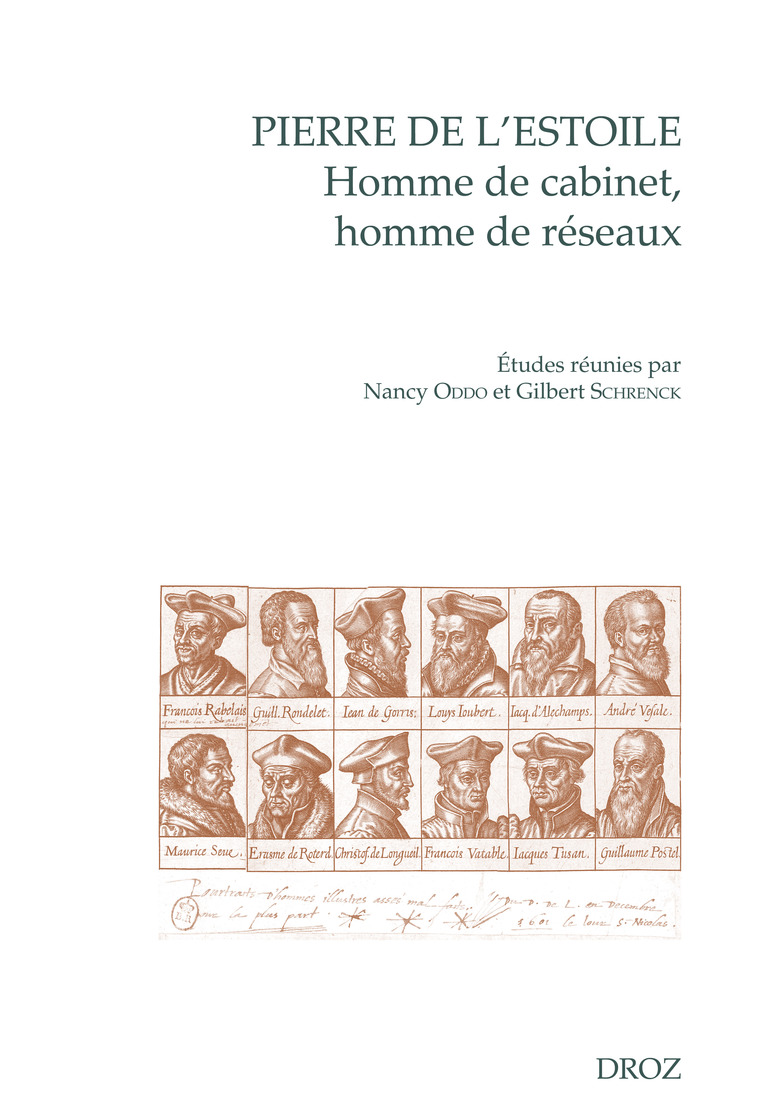 Pierre de L'Estoile, homme de cabinet, homme de réseaux, dir. Nancy ODDO et Gilbert SCHRENCK, Genève, Droz, 2025.
Pierre de L'Estoile, homme de cabinet, homme de réseaux, dir. Nancy ODDO et Gilbert SCHRENCK, Genève, Droz, 2025.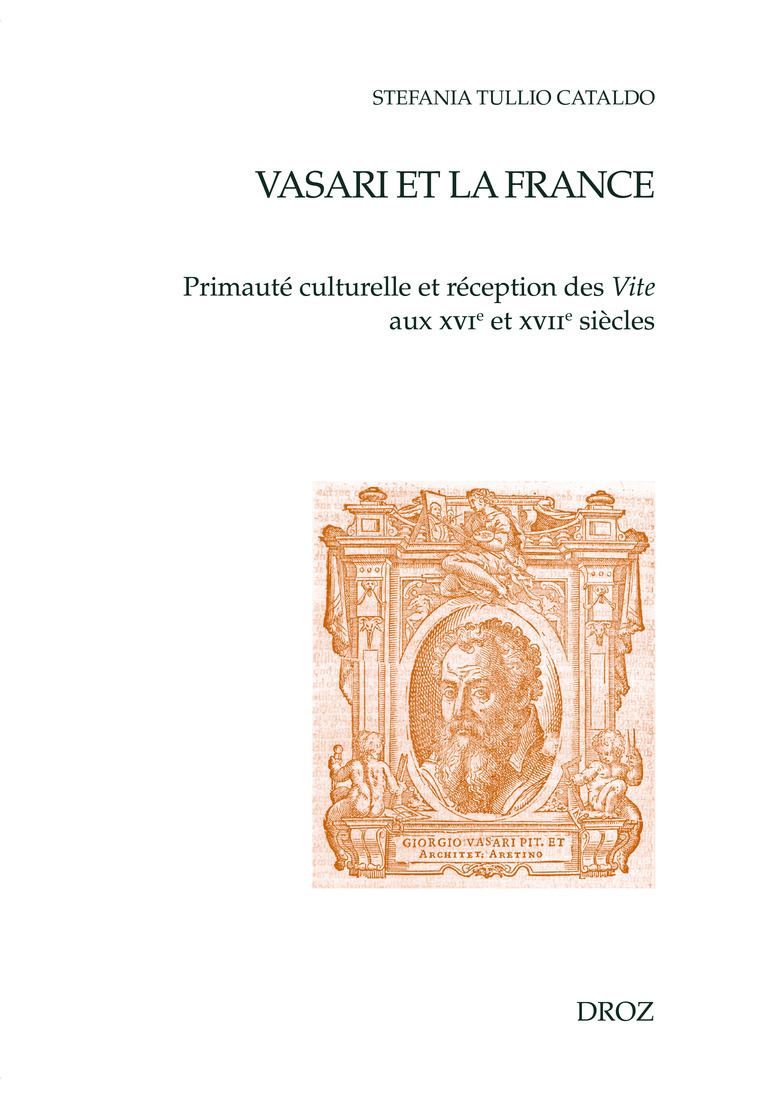 Stefania TULLIO CATALDO, Vasari et la France. Primauté culturelle et réception des Vite aux XVIe et XVIIe siècles, Genève, Droz, 2025.
Stefania TULLIO CATALDO, Vasari et la France. Primauté culturelle et réception des Vite aux XVIe et XVIIe siècles, Genève, Droz, 2025.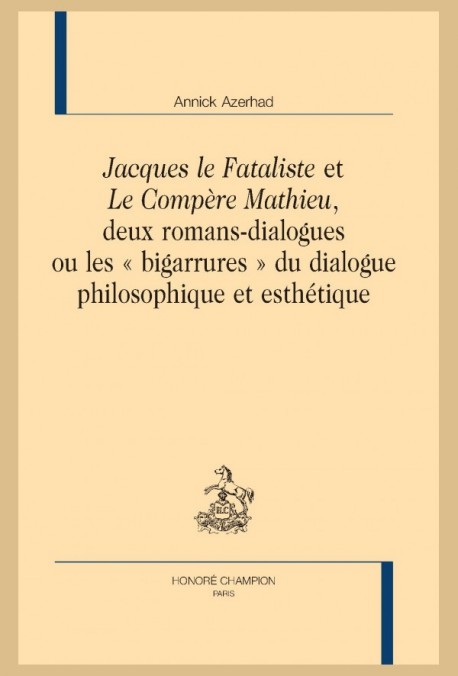 Annick Azerhad, "Jacques le Fataliste" et "Le Compère Mathieu", deux romans-dialogues. Ou les "bigarrures" du dialogue philosophique et esthétique, Paris, H. Champion, 2025.
Annick Azerhad, "Jacques le Fataliste" et "Le Compère Mathieu", deux romans-dialogues. Ou les "bigarrures" du dialogue philosophique et esthétique, Paris, H. Champion, 2025.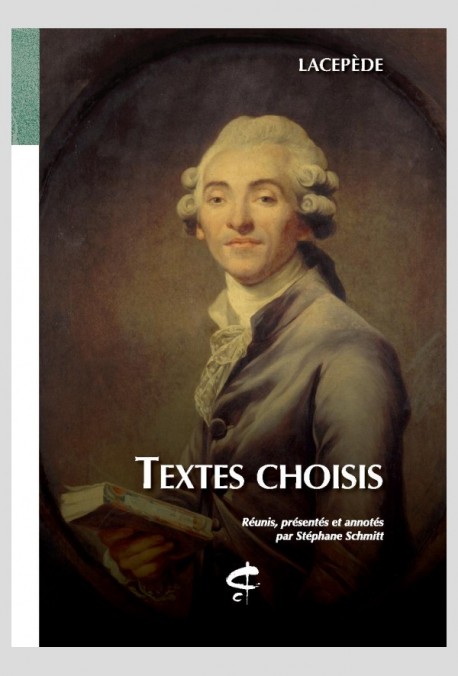 Lacépède, Textes choisis, éd. Stéphane Schmitt, Paris, H. Champion, 2025.
Lacépède, Textes choisis, éd. Stéphane Schmitt, Paris, H. Champion, 2025.